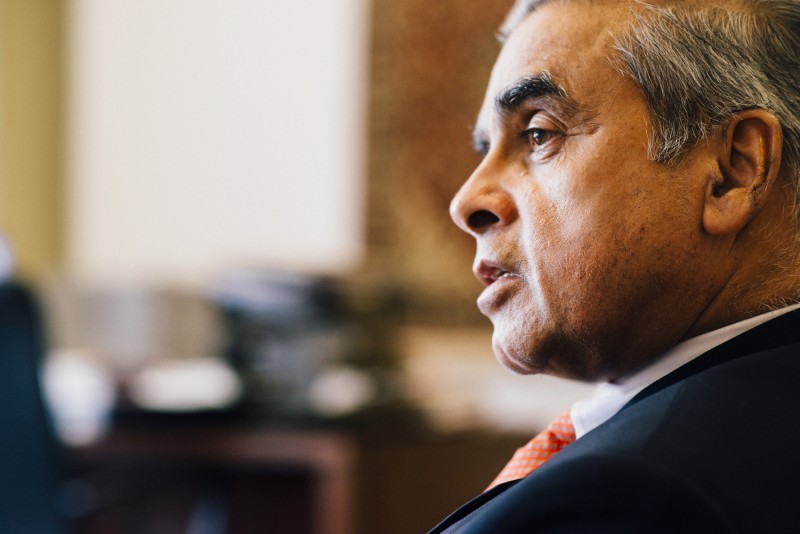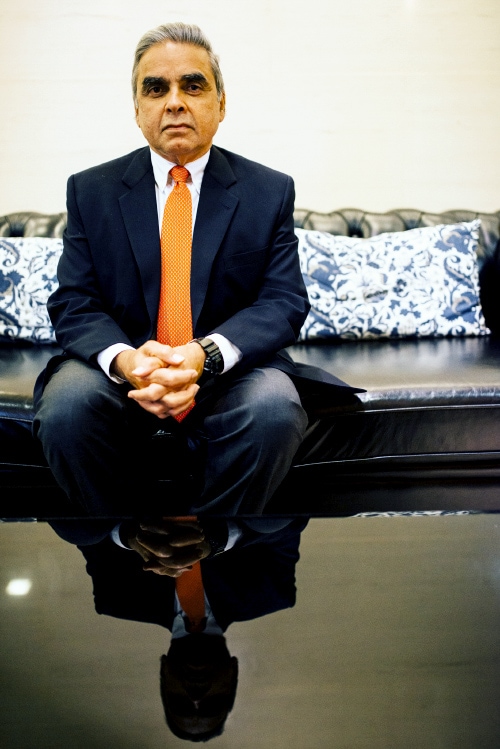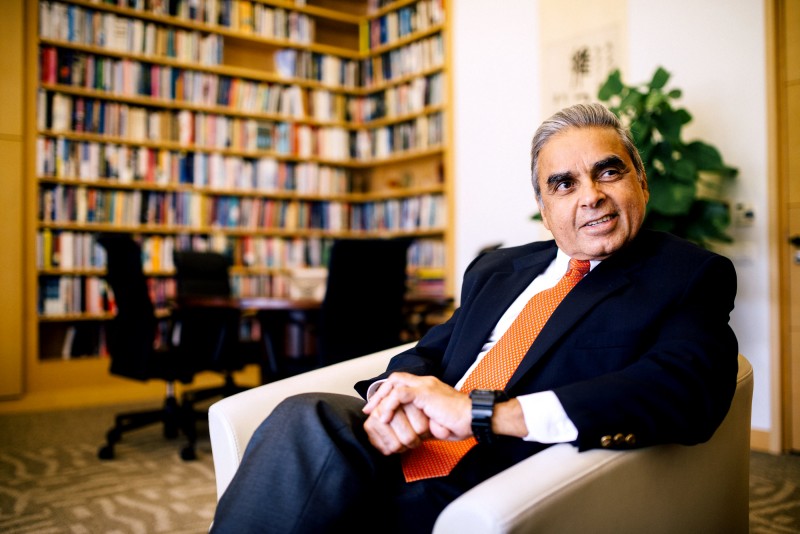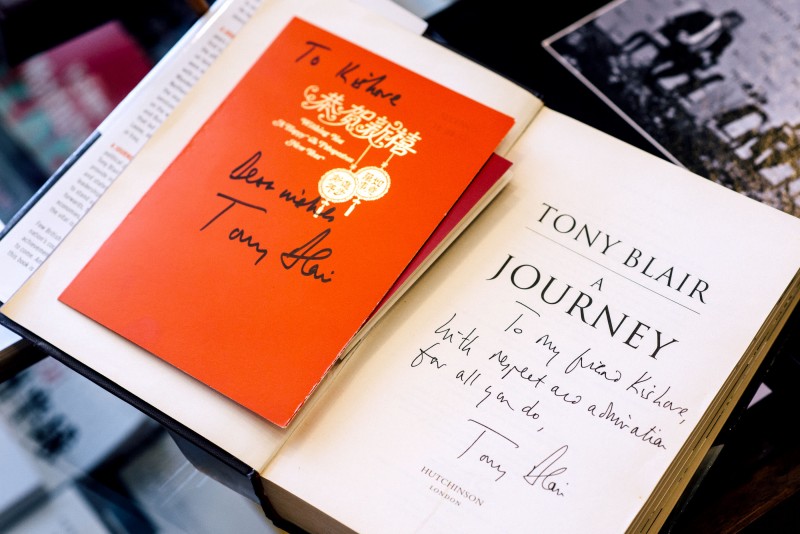I’m outside Kishore Mahbubani’s office, steeling myself for our interview. Unexpectedly, he pops out with his 3pm guest, greets me and says: “Can you give me five more minutes? I need to send out some emails.” I happily oblige. After all, if I were to apply Benjamin Franklin’s old aphorism of “time is money” to the allocated time slot which I’m given, it’s going to be a costly affair. An hour of Kishore’s time is reputedly worth ten to twenty thousand dollars. That’s his going rate as a keynote speaker and author of five highly acclaimed books on political and foreign affairs. His latest book: Can Singapore Survive? offers insights into the age-old question that Singapore has asked itself since independence, nearly 50 years ago.
Today, Kishore is in his customary formal attire. The black blazer and pressed white shirt are his normcore, with a slight deviation in the colour of his tie. It’s orange, and although that shade does somewhat brighten up his aura, his penetrating gaze and venerable stature still remain. “Please, take a seat,” says Kishore, in a dignified tone. For most of his career, Kishore was a high-flying diplomat, serving at one time as the President of the United Nations Security Council. Despite possessing a certain savoir-faire, he certainly does not hold his tongue. In his dialogue sessions, Kishore has established himself as a fearless dissenter-in-chief expressing repeatedly that “American soft power is the fastest deflating bubble that we have seen in the world today.” Ironically, such flagrant displays of belittlement have not done any harm to his eminence – in fact, it’s quite the opposite; American audiences actually pay to listen to him chastise their own country.
As he sits adjacent from me, he bears a striking resemblance to George Clooney; they share the same grey hairstyle and thick dramatic eyebrows. When I query him on the downsides of being a diplomat, he replies drily, “The job entails sacrificing your body for your country. The bullets that you have to take into your body are things like caviar and champagne.” I let out a titter. His razor-sharp wit and dry humour make him every bit a consummate mandarin.
Conversations with Kishore Mahbubani
WY-LENE YAP: Congratulations on your latest book: Can Singapore Survive? – I know that the initial title was supposed to be “Can Singaporeans Think?” but in all honesty, can Singaporeans really think for themselves?
KISHORE MAHBUBANI: Well, I think the problem for Singaporeans is that they have had an exceptionally good government for a long time, and it’s a bit like living in a nice, controlled glass box – in some ways, you can see things happening around the world, but you’re protected from it because everything is safe and secure. As a result, you lose some of your ‘jungle instincts’. Exceptional governments don’t last forever. You may at some point in time, have a more normal form of government, which leads to a bit more turbulence and uncertainty and Singaporeans have lost their ability to deal with that. So they have got to somehow recover some of their ‘jungle instincts’ and that is why it is good to expose Singaporeans at an early age to an environment outside of Singapore. For example, I do believe that every school in Singapore should be paired with a school in Southeast Asia. At the age of 9 or 10, you should start going to a part of the world that is so different and unregulated; where you have roads with mud, etc… Otherwise, you end up living in a cocoon and it’s very dangerous because you don’t have the ability to deal with difficulties.
WY-LENE: In your book, you presented very well-balanced and insightful perspectives on “Yes, No and Maybe”. If I were to ask you to choose a particular answer, what would it be and why?
KISHORE: Oh, the answer will be yes. Clearly, Singapore has invested so much in itself as a society in both the physical infrastructure (ships, airlines, banks, all want to come to Singapore because it’s so efficient) andhuman infrastructure (we have very talented people in key institutions like the civil service, judiciary, police, armed forces, etc). It’s remarkable what Singapore has and if you’re a betting person, you will definitely bet on Singapore not just surviving, but also doing very well.
WY-LENE: You have attributed Singapore’s success to 3 factors: Meritocracy, Pragmatism and Honesty. I am inclined to agree with you. However, do you think these 3 factors are also the cause of why we are one of the least positive countries in the world?
KISHORE: That’s a curious thing. Some surveys show that Singaporeans are happy, while others show that Singaporeans are unhappy. My own belief as to why there is a lot of unhappiness in Singapore is actually a result of us living in the most densely populated country in the world. Previously, I lived in a much more densely populated city in Manhattan – far more densely populated as compared to Singapore, and every weekend, people in Manhattan would go to the countryside…
WY-LENE: The Hamptons?
KISHORE: They can go everywhere like New Jersey or New York State. If they were to drive out, within an hour, you get a beautiful countryside. In fact, my wife’s parents would live in Morristown and it’s just beautiful. So by leaving Manhattan on weekends, not only did it liberate the city because half the population would be gone, but it also provided psychological release for them. This has created a kind of safety valve and that’s one reason why I’ve argued to get rid of the three-quarter tank rule. We should encourage Singapore cars to drive to Malaysia on the weekend. In addition, we need to understand that people need more space and encouraging Singaporeans to spend time in Batam, Bintan or Johor is good for Singapore.
WY-LENE: The burgeoning unhappiness is ubiquitous. Can it even be solved? And how should the government go about tackling the issue?
KISHORE: I think when it comes to happiness, all the government can do is to facilitate. The government cannot make people happy. People need to make themselves happy. The government’s role is to step aside as much as possible and let people grow, develop and flourish on their own. At the end of the day, Singaporeans need to find out who they are, and what makes them happy.
WY-LENE: But with the strong emphasis on economic prosperity and the fact that competition is so keen, I think people find it hard to relax here. Singaporeans always need to benchmark themselves against someone – a friend, colleague or family member.
KISHORE: You can choose to step out of the rat race. [laughs] And you can if you want to. If you focus your life primarily on material goods and see that as the be-all and end-all of life, then you will be constantly unhappy even if you have a billion dollars… because the next question you will ask is, “Why don’t I have ten billion dollars?”
WY-LENE: In 2013, WSJ called Singapore the next Monaco because all the ultra rich are flocking to our tiny island. Do you agree with that statement?
KISHORE: The ultra rich coming to Singapore is not a bad thing as it creates confidence. But at the same time, it is extremely important that they are not given any privileged treatment. For example, if they are caught speeding in their Lamborghinis, they should face the same penalty as the guy who is caught speeding in his Toyota Camry. The laws should be applied very strictly because if you give any hint that they are above the law, then we are in trouble.
WY-LENE: So is Singapore the next Monaco?
KISHORE: I think we are probably better off in some ways. Monaco is a very small city-state and if I’m not mistaken, it is smaller than Singapore. It’s charming and I have been there once, but it’s not a place that can accommodate a lot of people.
WY-LENE: Granted that Singapore has achieved economic prosperity for many years and there is no desolate poverty on our streets – however, in recent times, the income gap between the rich and the poor seems to be widening. The rich get richer and the poor get poorer… and this may potentially cause a social strife. What are your thoughts on this?
KISHORE: I think I would agree that inequality is a challenge in Singapore. From my experience having lived in New York, even though the per capita income of the poor is higher than the ones in Singapore, they lead a miserable life. They have no access to healthcare, education, or housing – and you see a lot more homeless people on the streets. There is a philosopher called John Rawls who wrote a book: A Theory of Justiceand he said, “The most just society is the one that you want to be born in.” I mean if you’re born ultra wealthy then clearly you may want to choose New York City. But if you’re going to be born into poverty, then you don’t want to be born in New York City – you would rather be born in Singapore.
WY-LENE: You stated that ‘dual identity’ is one of the seven pillars of Singapore’s soft power. Do Singaporeans have their own identity? And what is our identity anyway?
KISHORE: On the issue of national identity, Singapore is still a work in progress. We have come a long way and we have now accepted our multiracial framework –more comfortably than other societies. However, we must constantly work on it so as to create a greater sense of national identity. For example, when I travel overseas, the one thing that connects me to a fellow Singaporean is when I use Singlish. And that’s when I know this man or woman is from my tribe. Recently, I went to Greece [Athens] to celebrate my 30th wedding anniversary. While I was running around the Parthenon, I saw two ladies playing with a child and overheard their voices. So I said, “Singapore?” And they said, “Yeah, Singapore.” [laughs]
WY-LENE: You’re a big advocate of a car-less Singapore. However, the car has always been viewed as a status symbol. How can we move away from that?
KISHORE: I’m glad you brought that up. I think one way of reducing unhappiness in Singapore is to give up the car as an aspirational symbol. In the 1980s to 2000s, it made sense to look at the car as a status symbol. Now, we are entering (what I call) the post-car ownership era – basically, the purpose of the car is to get you from point A to B, in the fastest way possible. In the past, the only way to do that was by owning a car. But with the advancements in technology and the use of your smartphone, you can make a request: I want to go from Bukit Timah to Siglap, and a driver with a car will take you to your destination. So you don’t have to worry about parking, road tax, petrol, COE, etc. The government should be creating an enabling infrastructure to enable these car services to thrive and prosper – and if necessary, subsidise them at the beginning so that people give up the idea of owning cars. MIT has done a study and I quoted it in my book: Singapore does not need a million cars on the road to complete all the trips that have to made in the course of a day. The same number of trips can be made by 300,000 vehicles. With less cars on the road, Singapore will have cleaner air and become a much more beautiful environment to live in.
WY-LENE: With the spade of public transportation woes, will our current transport services be able to cope with the rising population?
KISHORE: Yes, certainly. I’m not saying we reduce the number of trips, but you can make the same number of trips with a smaller amount of cars. As you know, the government is making a massive effort in terms of building more trains to keep up with the demand and within 2 to 3 years; we are going to cross the hump. So once you combine the new MRT lines, buses… it will create a car ownership-less society.
WY-LENE: Do you own a car?
KISHORE: Yeah, because the infrastructure has not been created yet. But I’m dying not to own a car. Singapore’s taxi service is surprisingly unreliable – my wife wanted to go the airport one morning at 930am: no rainstorm, bright sunshine and I called every taxi number, but I still could not get a taxi. As Uber says, “When demand is high, there is a surge in price.” And I’m happy to pay the surge in price. But I want to have the assurance that the car will be available within 5 minutes. Then, I won’t have to own a car and I can save a lot of money because the sunk cost of owning a car is incredibly high in Singapore.
WY-LENE: Is Elon Musk’s vision to have mass-marketed electric cars the way to go for the future?
KISHORE: Certainly – we should switch from gasoline driven cars to electric cars in Singapore because you only drive a maximum of 50 to 60 kilometres a day.
WY-LENE: You wrote in The Straits Times that 2014 was the year of new Big Ideas for Singapore and you urged readers to e-mail potential Big Ideas to you. How many did you receive and what was the biggest idea?
KISHORE: Surprisingly, I didn’t receive many. [laughs] However, the readers wrote in and gave encouraging responses to my ideas and I was very happy about that.
WY-LENE: After you graduated from college, why did you choose to join the Ministry of Foreign Affairs?
KISHORE: I had no choice. I couldn’t have gone to college if I didn’t get a scholarship. I’m ethnically Sindhi and most Sindhis after high school start working as a salesman in a textile shop. As such, I started working as a salesman in a textile shop and I was earning 150 dollars a month. Then out of the blue, I got the President’s Scholarship which gave me 250 dollars a month. So my mother said, “250 dollars is more than 150 dollars. Stop selling textiles and go to university.”
WY-LENE: What were some of your biggest accomplishments as a former Singaporean diplomat and President of the United Nations Security Council?
KISHORE: I was the ambassador to the UN during the period when Singapore was serving on the UN Security Council. To borrow a football analogy – this would be akin to the Singapore football team playing in the World Cup Tournament; furthermore, it would not be unfair to assume that Team Singapore would lose all its matches. However, we punched well above our weight and managed to win some ‘matches’ in the diplomatic arena. The most important rule for any representative of a small state is to try and keep your country safe and peaceful. The fact that Singapore has enjoyed 50 years of peace, and never once had to resort to military force, shows that our leaders are doing a great job with the support of an excellent diplomatic service.
WY-LENE: Was it tough being a diplomat? The travelling must have been an upside.
KISHORE: No, surprisingly when you’re a diplomat, quite often, you don’t travel that much because you’re assigned to a particular country. I joined the Foreign Service in 1971 to see the world, but when I left in 2004, I saw more of the world. I travel more in my capacity as a dean, than when I was a diplomat. [laughs] Being a diplomat entails sacrificing your body for your country. The bullets that you have to take into your body are things like caviar and champagne. And they’re very damaging. Unfortunately, when you entertain or are being entertained, you have to be part of the process which requires you to eat, drink and be merry.
WY-LENE: What are some of the greatest personal lessons that you have learnt from our founding father, Mr Lee Kuan Yew?
KISHORE: One of the extreme privileges in my life was the chance to work with 3 great founding fathers: Mr Lee Kuan Yew, Dr Goh Keng Swee and Mr S. Rajaratnam. By an incredible stroke of luck, Singapore had 3 amazing minds, and they were working in the government at the same time. I learnt many lessons from them, but the most important lesson is to be as realistic as possible in your analysis of the rest of the world. If you’re a small country and develop illusions about the rest of the world, and start making policies based on these illusions, then the small country will suffer and disappear. Small countries can never afford to have illusions about the state of the real world.
WY-LENE: How did you become the Dean of the LKY School of Public Policy?
KISHORE: As my term in New York was ending, I was fortunate enough to be invited to lunch by the then Deputy Prime Minister, Dr Tony Tan [2003]. He told me the government intended to recognise Mr Lee Kuan Yew’s contributions to Singapore – on the occasion of his 80th birthday on September 16, 2003 by announcing a school of public policy in his name. Thereafter, he asked me if I would like to be the founding dean, so I said, “Sure, I’ll give it a try.”
WY-LENE: It’s almost 11 years. How has it been so far?
KISHORE: I became the dean in August 16, 2004. The school has been phenomenally successful because in 10 years, we have become the third best endowed school of public policy in the world, after the Harvard Kennedy School which has been around for over 50 years. The Woodrow Wilson School has also been around of a long time. The Harvard Kennedy School has an endowment of a billion dollars for a thousand students, and the Woodrow Wilson School which is the richest school per capita has raised 600 million dollars for 200 students. So per capita, the Woodrow Wilson School is 3 times as rich as the Harvard Kennedy School. But we have managed to raise about 300 million dollars for 300 students, so per capita, we are the same as the Harvard Kennedy School.
WY-LENE: What kind of advice do you normally give your students?
KISHORE: As a bearer of Mr Lee Kuan Yew’s name, our school has to maintain the highest standards of integrity – values that he espoused and embodied as a leader. As such, plagiarism of any kind is not allowed.
WY-LENE: You mentioned as a country, we have become quite risk-averse. What are some of the biggest risks you have taken before?
KISHORE: The biggest physical risk I took was in 1973, when I was invited to become the chargé d’affaires of the Singapore embassy in Cambodia. It was very unusual as I was only 24 at that time. The reason why they offered it to me was, initially, they offered the position to someone else and he turned it down because of his wife and children. Subsequently, they offered it to another person, and he also turned it down because of family reasons. Basically, everyone turned it down. I was young and foolish, so I accepted the assignment. The city of Phnom Penh was shelled every day and it’s a bit like being in Baghdad or Kabul. One afternoon, when I was at home having my afternoon siesta, a 500-pound bomb was dropped on the presidential palace which was next to my house. The whole house lifted up and I fell off the bed… like an earthquake. I quickly ran to hide under the staircase and I’m glad that I did, because when the second bomb fell, glass shards flew everywhere… thankfully, I managed to survive. I accidentally walked through a minefield too.
WY-LENE: When you were younger, you told Dr Goh Keng Swee that you were a “pacifist”. Are you still one now?
KISHORE: No, no… I’m not a pacifist. If you give up your military capabilities, you’re asking for trouble. It would be very unwise to do so.
WY-LENE: You have met many world leaders over the course of your career. What makes a great and effective leader?
KISHORE: Well, I have photographs of me shaking hands with Mikhail Gorbachev, Ronald Reagan, Tony Blair… you have to let time settle in before you discover who is a great leader and who is not. I have met Ronald Reagan at least 2 to 3 times; once with Mr Lee Kuan Yew in the White House and another time at the UN. Based on first impression, he did not appear to be an intellectual – and he wasn’t one. But he turned out to be a great leader because he had a clear vision of what needed to be done and he did it very well. If I were to compare Jimmy Carter with Ronald Reagan, although Jimmy Carter is more of an intellectual, he clearly accomplished much less than Ronald Reagan.
WY-LENE: Who are some of your favourite philosophers?
KISHORE: Essentially, I studied 3 philosophers quite deeply: Ludwig Wittgenstein, Karl Marx and John Rawls. So I was Singapore’s only official Marxist in the 70s. I think Karl Marx will go down as one of the greatest philosophers of all time – he had a clear understanding of how societies change through economic development.
WY-LENE: Do you enjoy writing?
KISHORE: Yes, a great deal and that is why I have 5 books under my name. I’m working on my sixth book on ASEAN and hopefully it will be out this year.
WY-LENE: What kind of books do you read?
KISHORE: A variety – from time to time, some novels. There is a very good novel called A Different Sky by Meira Chand, which I enjoyed enormously. A Case of Exploding Mangoes is a great Pakistani novel. Of course, I read books on International Relations like Is the American Century Over? by Joseph Nye. His answer is no, and my answer is yes. [laughs]
WY-LENE: What’s the greatest challenge ahead for Singapore? Is it the need to stay relevant?
KISHORE: The greatest challenge for Singapore is to avoid complacency and I completely agree with our Prime Minister that it is good to be paranoid. If Singaporeans assume that peace and prosperity are as natural as the sun rising in the morning, then something has gone wrong. The peace and prosperity of Singapore requires continual vigilance.
WY-LENE: There is a lot of buzz surrounding the next general elections and PM Lee Hsien Loong said that it will be a “deadly serious fight”. How do you think it will pan out?
KISHORE: I am pretty confident the PAP will win the next elections. And I’m prepared to take bets with anyone. [laughs] The big question is how many seats the opposition will win – there is a possibility that the opposition will win more seats, but I see no danger of the PAP losing power.
WY-LENE: How about Hilary Clinton? Is she a prime candidate to win the next presidential election in 2016? And is the U.S ready for a female president?
KISHORE: Definitely. I can confidently predict that she will get the nomination of the Democratic Party and will most probably win the next presidential election. But in American politics, surprises can happen – it was almost a certainty she would win the last democratic nomination in 2008, but she lost to Barack Obama.





